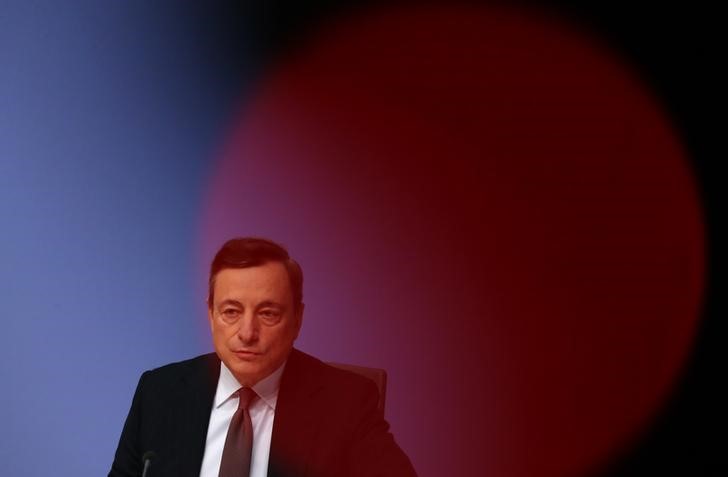By Francesco Canepa and Andreas Framke
FRANKFURT (Reuters) - The European Central Bank kept its super-easy monetary policy unchanged as expected on Thursday and its president, Mario Draghi, told critics of his stimulus path to be patient and wait for the euro zone's recovery to take firm hold.
With growth slowly picking up pace, the ECB kept its various rates at next to nothing or negative and asset buys at a record pace. It reaffirmed that rates would stay at their current or lower levels for an extended period and that it was also ready to increase or extend it bond purchases if the outlook worsens.
"The recovery of all of the euro zone is in the interests of everybody, including Germany," ECB President Mario Draghi told a news conference, responding to criticism, notably from Berlin, of his stimulus program.
"German savers have benefited not only as savers but also as borrowers, as entrepreneurs, as workers, like all the other citizens of the euro zone. So we have to be patient. As (the) recovery will firm up, real rates will go up."
Draghi described the current euro zone recovery as "dampened by the sluggish pace of structural reform" and insisted a "very substantial degree" of monetary policy stimulus was needed.
The euro fell to a day low of $1.0607 after Draghi said underlying inflationary pressures remained subdued and that, once the base effect of rising oil prices had been accounted for, there were still no real signs of a upward trend.
While Draghi warned that global risks to the euro zone economy were still slanted to the downside, he said it was too early to assess what impact Britain's planned exit from the European Union and its single market would have.
The recovery still relies heavily on ECB stimulus and markets could become more volatile as the Federal Reserve gradually raises rates, underscoring diverging policy paths between Europe and the U.S.
That said, inflation hit a three year high last month, manufacturing activity is accelerating and confidence indicators are firming, all pointing to solid growth at the end of last year.
Indeed, euro zone business growth was the fastest in more than five years in December, order books are surging on export demand, and consumption is holding up, despite rising energy costs, all pointing to the sort of resilience not seen since before the bloc's debt crisis.
But the underlying picture is mixed.
Inflation is still just half of the bank's 2 percent target and the jump is mostly down to higher oil prices.
The market euphoria after Donald Trump's surprising U.S. election win is also yet to be backed up concrete policy action and the threat of more protectionist policies from the United States and possibly Britain could reverse market sentiment.
The ECB last month agreed to cut its asset buys by a quarter from April but extended the 2.3 trillion euro scheme, known as quantitative easing, until the end of the year, promising substantial accommodation and extended market presence.
The extension threatens to reignite tensions between the bank and Berlin, particularly as Germany heads toward an election in the fall and with Finance Minister Wolfgang Schaeuble often pointing the finger at the ECB for problems.
Berlin argues that super cheap borrowing costs negate pressure on inefficient euro zone members to reform but unduly punish frugal German savers, who have seen the return on their savings evaporate.
Indeed, with German inflation rates above the euro zone average and government bond yields in negative territory across much of the yield curve, real rates are negative for many savers, pushing some voters toward the rightist Alternative for Germany party.
